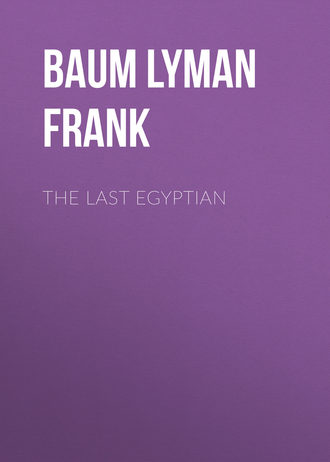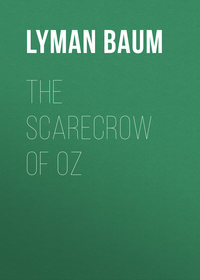 полная версия
полная версияThe Last Egyptian
For a moment the dragoman sat still, his heart beating wildly. Here was a find, indeed! He knew of a dozen scholars who would willingly bankrupt themselves to discover a new papyrus roll.
He crawled slowly back to the arch and seated himself where a ray of light came between the mat and the gray stones. Here he unrolled the manuscript and examined it eagerly. He did not claim to be much of a student, but he could read hieroglyphics a little and was a judge of ancient picture-writing. Here was doubtless a scroll of great antiquity and value, relating incidents of the war of Rameses against the Kheta, and its state of preservation was wonderful. In this place was a list of captives brought back to Thebes; in that was the expense account of the army. Here was told the —
“Henf!”
The sharp, quick cry was followed by a sudden rustle of the rushes, and with a spring like that of a panther, Kāra was upon the impudent intruder into his domain. Before Tadros could rise, his assailant was kneeling upon his body and with lithe, delicate fingers clutching viciously at his throat. The dragoman struggled to free himself, but could not. He tried to breathe, without effect. The skin of his bronzed face grew black, and his eyes protruded from their sockets with a look of horror and fear.
Seeing this, Kāra’s set face suddenly relaxed and lost its look of murderous determination. He released his hold of the dragoman and pushed away the mat to allow more air to get to him.
Slowly the other, gasping and uttering low moans, recovered his breath. Kāra’s fingers had left great discoloured blotches upon his neck; but that did not matter. From certain death he was coming back to life, and the transition was one to evoke gratitude and joy. Life was sweet to the dragoman – the sweetest thing he possessed.
Kāra, standing erect, looked down upon him with arms folded in repose and a countenance very thoughtful. Two reasons had stayed his vengeful hands. To murder Tadros would get him into trouble with the authorities, and so cause him great annoyance at this critical juncture, when liberty of action and freedom from espionage was important. In the second place, his half-formed plans included the use of the dragoman for his own advantage. Tadros was both clever and well known. He would become a good servant when he knew it would further his personal interest to be faithful, and so it was best that the dragoman should live – for a time.
He had now almost recovered from the shock of Kāra’s assault, and began to grow angry.
“What do you mean, you dog, by felling me like a wild beast and trying to throttle me?” he demanded, with his first breath.
“What do you mean by stealing into my house and prying into my private affairs?” returned Kāra brusquely.
The dragoman’s eyes fell upon the papyrus at his feet, and his face changed its expression.
“Where did you get it?” he asked, quickly. “Are there more of them? Is it a tomb or a temple? Tell me, Kāra, tell me all about it.”
The Egyptian smiled, grimly.
“There are more of them,” he said. “Look! in that corner are fourteen other rolls; but whether they came from a tomb or a temple I do not know. They are my inheritance from Hatatcha. Where she found them she alone could have told; but she carried the secret to the nether world.”
Tadros mused for a time.
“Where have they been kept all these years?” he asked in a tone of disbelief.
“Hidden underneath the rushes of her bed. I dragged them all out last night, as you can see.”
“Were there any more of the coins?”
“A few.” He showed some in his hand.
“Ah!”
The dragoman drew a deep breath.
“You are rich, my prince,” said he. “Fifteen papyri of the ancient days! – they are worth a fortune in any event.”
“How much?” asked Kāra, amused.
“This one,” said Tadros, picking it up and partly unrolling it to glance again at the writing, “I could sell in Cairo for five hundred piastres – perhaps a thousand. It is wonderfully clear and well preserved.”
“You may keep it for yourself,” said Kāra.
Tadros stared.
“I will exchange it for the girl Nephthys,” continued the young man, coolly. “For her you have paid to old Sĕra two hundred and fifty piastres already. You must pay a like sum to take the girl away with you, and afterward you must pay for her support. Very well; I will relieve you of the burden. You will not only save your money, but you will get a papyrus worth four times what you have invested.”
Tadros frowned and looked glum.
“But the girl is mine!” he exclaimed.
“And the papyrus is mine,” returned Kāra. “Perhaps I could buy two or three like Nephthys with it; but never mind, it shall be yours in the way of exchange.”
Tadros moved uneasily and cast a longing glance at the roll.
“I like not this barbaric traffic in womankind,” he muttered, with indecision.
“Nor I,” agreed Kāra. “It is Sĕra who is to blame. If she has a fat daughter, she will want a fat price for her. Otherwise, how can she be recompensed for the girl’s keep? But five hundred is too much for Nephthys. I would have to give her mother the other two hundred and fifty piastres myself – and you would have the roll. By Isis, ’tis a bad bargain! Here; let us say no more about it. Give me the papyrus.”
“Wait – wait!” cried Tadros. “Why are you so unjust in your conclusions? The bargain is made. No one but a sneaking Arab goes back on his word.”
“It is as you say,” replied Kāra, stretching his long arms and yawning. “But it is a fine papyrus, Tadros – all about the Kheta and King Rameses.”
“I know; I know!” returned the dragoman, nervously tucking his prize under his arm. “Come with me at once. I will inform Sĕra of the transfer of my property.”
He rose to his feet a little unsteadily, because his throat still hurt him, and led the way.
Kāra quietly followed.
In Sĕra’s hovel mother and daughter were weaving upon a rude cane loom.
“See here,” announced the dragoman; “this Nephthys is too free with her favors, and I cannot be coming forever to this forsaken village to look after her. Besides, I must get back to Cairo to attend to my business, so I have sold the girl to my friend Kāra here, and when he takes her away from you, if ever he does, he is to pay the other two hundred and fifty piastres I promised.”
Sĕra seemed surprised, but nodded her head cheerfully.
“It is all the same to me,” she replied. “If the royal one has the money to satisfy you, it is none of my business, I am sure. An alliance with the descendant of the great Ahtka-Rā is something to be proud of.”
The girl had broken a thread. As she prepared to retie it, she glanced from one to the other of the two men with a look of indifference.
“I do not promise to make Nephthys a wife,” said Kāra, slowly, “although, of course, it may come to that. My plans are not formed for the future. But I have acquired the girl in betrothal through my compact with Tadros, and his rights are hereafter mine.”
“She grows plumper every day,” said Sĕra, glancing at Nephthys critically. “You will seek long, my Kāra, before you find a more desirable wife. Yet I am in no hurry to lose my daughter, believe me, even for the money she will bring. Take your time about deciding the matter.”
“I will,” responded Kāra, briefly.
“And now, tell me, what has become of your grandmother, Hatatcha?”
“I have carried her into the desert to be embalmed.”
And then, to avoid further questioning, he went away.
CHAPTER VI
KĀRA BATHES IN THE NILE
Tadros followed him into the street again.
“Those other papyri,” he said – “do you wish me to sell them for you?”
“They are already sold,” replied Kāra, regardless of truth.
“Indeed! To whom?”
“Winston Bey, the Englishman.”
Tadros uttered an exclamation of annoyance.
“Where have you met him?” he asked.
“Here, at the Nile landing. His boat will come to-night for the papyrus rolls.”
Many thoughts passed rapidly through the dragoman’s mind. Here was bad news, indeed. He had planned on getting all those wonderful rolls into his own hands, and his disappointment was keen to find that this isolated Egyptian of an out-of-the-way rock village had already been approached and bought up by one of those rascally scientists, before he, the clever dragoman, had even known of the existence of the treasures.
“He will rob you,” he ventured to suggest.
“Very well,” replied Kāra, indifferently.
Tadros was in despair. Yet one thing was plainly evident – if Winston Bey was about to unload fourteen newly found rolls of papyrus upon the directors of the museum in Cairo, it would be well for him, the dragoman, to get his one roll in first, at the highest possible price. That could easily be accomplished. Winston’s dahabeah would consume four or five days on the downward voyage. Tadros could cross the Nile in a small boat and catch the railway on the other bank, which would land him in Cairo the next day. He promptly decided to take the railway.
“I expect,” said Kāra, “to be in Cairo myself shortly. If you are there, I would like to hire your services as dragoman.”
Tadros, aroused from his meditations, gave a start, and wonderingly examined the speaker from his dirty bare feet all the way up his soiled burnous to his strong, calm face and faded turban. He had been a native of Fedah himself, and had known “the royal one,” as he scornfully called Kāra, from boyhood. Until now he had regarded him as a permanent fixture of the little village; a listless, lazy do-nothing, supported in some mysterious way by his grandmother and destined to grow old amid his solitary surroundings.
Some slight importance Kāra had doubtless acquired through his inheritance of the papyri; but that he should think of visiting Cairo and employing the brilliantly appareled dragoman was a marvel that fairly astounded Tadros. Yet, why not? He would have money. Tadros could assuredly teach him how to spend it. Kāra might become an incident in his career – an element in his future prosperity.
“Call upon me at any time,” he said, condescendingly. “You shall have the advantage of my experience and knowledge of the world.”
“That is what I want,” returned the Egyptian, “and I will pay you liberally for it.”
He passed into his dwelling, and the dragoman, watching him go, decided to make speedy preparation for his own departure.
He felt much easier in his mind than at first. What if Winston Bey purchased the papyrus rolls? Would not Tadros be the young man’s guide? Very good. Very good, indeed!
Kāra lay down again and slept until after noon. Then he went to the hut of Nefert, who baked the bread for the village, and bargained with her for a loaf and a bowl of milk. Also he acquired from her a large, coarse sack. In exchange he gave her Hatatcha’s water jar, which had come from Keneh, and an old scarf his grandmother had worn over her head.
He ate the loaf and drank the milk, feeling much refreshed. Then he carried the sack to his dwelling and placed the papyrus rolls in it.
From the secret cavity beside the arch he took the bronze vase with the metal stopper, a scarab ring that his grandmother had sometimes worn, and a slender dagger with a steel blade. The bronze dagger that served as a key to the rock door he left in the cavity, as well as the lamp.
Having replaced the stone, he glanced around to see whether there was anything that might be disturbed or stolen during his absence; but the room was bare of anything to tempt a thief or a despoiler. So he swung the sack over his shoulder and walked out and around the end of the mountain on his way to the Nile.
Winston Bey had kept his word. On the chance that the strange Egyptian he had encountered would manage to secure either valuable information or some ancient relics from his mysterious grandmother, he had kept his dahabeah in the neighborhood, ignoring the protests of his unhappy Arab crew. The afternoon following his interview with Kāra, he landed near the group of palms an hour before sunset, and waited until darkness fell without obtaining a sight of the Egyptian. Then he dropped down the stream to Tel El Armana, where the dahabeah remained until the next noon.
To-day he figured on another disappointment; but when Gerald Winston had an object in view he pursued it with dogged determination, and he had resolved to keep his appointment each day for a week at least before considering his future actions. There was no question but he was on the track of an important discovery, and he did not intend to abandon the quest lightly.
On this second day, therefore, when he approached the grove and saw a white-robed figure sitting in the shade, his heart gave a joyful bound. He hurried forward and recognized Kāra, who remained motionless until the Englishman had saluted him. Then he bowed his head gravely.
Winston’s eyes were on the sack that rested beside the Egyptian, and his voice sounded eager in spite of his effort to restrain it.
“Well, my brother?” he exclaimed.
“My grandmother, Hatatcha, is dead,” said Kāra.
The Englishman shrank back in horror.
“You have killed her?”
“Oh, no; not at all,” answered the other composedly. “She was dying when I returned home after my conversation with you. It would not pay me to kill Hatatcha, you know.”
“What did you learn from her?”
“Nothing. She was beyond questioning. But she whispered that I should seek under the rushes of her bed for my inheritance, and then Anubis took her to his kingdom. Her secret, if she had one, she carried with her.”
Winston was deeply chagrined. He reproached himself for not having interviewed the old woman in person and endeavored to wrest her secret from her. Now, alas, it was too late!
“What have you in the sack?” he inquired, almost indifferently.
“My inheritance,” said Kāra.
“Of what does it consist?”
“I have fourteen rolls of ancient papyrus manuscript.”
“Fourteen rolls?” cried Winston, trembling with sudden excitement. “Let me see them, man – let me see them!”
Kāra did not move.
“I am going to Cairo,” said he. “Will you take me with you in your boat?”
“Yes; to be sure. Come to the boat at once.”
“That is better,” declared the Egyptian. “You can then examine the papyri at your leisure and determine whether they are of interest to you.”
He slowly arose to his feet and swung the sack across his shoulder. Winston eagerly preceded him. The stifling heat was all forgotten. Hatatcha’s unfortunate death was forgotten. A treasure had been unearthed at last, and surely from fourteen manuscripts much important information might be gleaned.
On the deck of his dahabeah he glanced at the papyri with amazement. Each one was perfectly preserved and unrolled without danger of breaking.
“Their condition is extraordinary!” he observed. “Where, did you say, you found them?”
“In a hollow of earth, covered by the rushes of Hatatcha’s couch.”
Winston raised his head to look at the speaker closely.
“Then they have not been there long, I am sure.”
“That,” said Kāra, with a shrug, “is a matter of which I have no knowledge.”
The scientist carefully unrolled a manuscript.
“This,” he said, musingly, “is a poem by the poet Pen-ta-urt. And it is a composition I have never seen before.”
He began reading it, and soon Kāra corrected him in a passage and explained how he should properly translate it. Winston’s eyes sparkled. This Egyptian really knew the hieroglyphics better than he did. His assistance might be invaluable in some ways. Perhaps the man would prove as remarkable a find as the manuscripts.
The next writing was an address to his soldiers by Amenhotep III, on the eve of his invasion of Syria. It was beautifully executed, and would prove a valuable addition to the literature of the fifteenth century before Christ.
Far into the night Winston pored over the writings, finding in some veritable treasures and in others little of worth save for their age and beauty of execution. Still, as a collection, the fourteen rolls constituted a remarkable library of ancient literature, and its fortunate discoverer slept but little on that eventful night.
Before daybreak the dahabeah was wheezing and puffing down stream on its way to Cairo, and Kāra, who had slept well extended upon the deck, was given a breakfast such as he had never before tasted. The fragrant coffee was a revelation to him, and the chops and fruit made his eyes sparkle; yet so sedate was the Egyptian’s demeanor that Winston was unaware that his guest had never before eaten a properly prepared meal.
The Englishman’s satisfaction this morning was so great that he also bestowed upon Kāra one of his choicest cigars, and again the Egyptian tasted a luxury hitherto unknown to him.
While they were quietly enjoying their smoke Winston said:
“Will you sell me the rolls?”
“Yes,” replied Kāra.
“I will give you a thousand Egyptian pounds for them. That, you know, is about a hundred thousand piastres.”
Kāra made a mental calculation and frowned darkly.
“Perhaps it is not enough,” added Winston, quickly; “but on the other hand it may be too much altogether. Until I have examined the writings with more care I cannot value them accurately.”
“I will accept your offer,” said the Egyptian, still frowning. “I am sure it is fair, and even liberal. What annoys me is that I have made a fool of myself.”
“In what way?”
“I purchased a girl yesterday, and paid three times what she is worth.”
Winston smiled.
“Do not let it bother you,” he said, in an amused tone. “Few women are worth what they cost, believe me, and where their sex is concerned men are often fools.”
“My brother’s speech is wise,” returned the grave Kāra. “I will conceal my annoyance, for some day I may be indemnified.”
“Had Hatatcha any of the coins of Darius Hystaspes left?” inquired Winston, after a moment’s thought.
“Here are seven,” said the other, producing them.
The Englishman was delighted.
“I will pay you five pounds each for these,” said he.
“Then they are yours,” declared Kāra.
Afterward he showed the Englishman the bronze vase, which also changed hands at a liberal purchase price.
“And is this all?” asked Winston.
“It is all,” said Kāra.
“You will be rich, my brother. Here are ten pounds in English gold to seal our bargain. After we arrive in Cairo I will take you to my banker and transfer to your account the entire amount due you. You may draw then upon the bank as you require your money, in any sums that suit your convenience – so long as it lasts.”
“I thank you,” replied the Egyptian.
As they proceeded down the river, Kāra noted the spotless tunics and trousers of the Arabs, who one and all regarded “the dirty Copt” with open contempt. He also examined intently the Englishman’s dress. When the boat tied up at Assyut to allow Winston to visit a friend who was convalescent at the excellent hospital maintained there, Kāra walked through the bazaars, and returned to the dahabeah bearing several bulky packages.
That night he bathed in the river while the others all lay asleep. Afterward he stealthily transferred the contents of his turban to a chamois bag, which he fastened around his neck. Then he flung the old burnous and the turban overboard.
In the morning they found the Egyptian transformed. He wore an English shirt, with collar and necktie all of white, loose linen trousers that were gathered at the ankles in Arab style, and over these a flowing white burnous of spotless purity. Upon his head was a red fez; upon his feet red slippers from Algiers; about his neck hung the massive chain of the kings; upon his finger was his grandmother’s ring set with the scarab of Ahtka-Rā.
Winston was astonished, and gazed upon the Egyptian with approval. Then his eye caught the chain, and he uttered an exclamation of wonder.
“Where did you get it?” he asked, clutching at the chain to examine one of its exquisitely engraved links.
“It is also a part of my inheritance, but an heirloom that I dare not part with,” returned Kāra. “It is the record of the kings, my ancestors, from Mēnēs to Ahtka-Rā,” and he explained the meaning of the chain to Winston, and assisted him to decipher some of the inscriptions upon the heavy links.
“But this is a priceless treasure!” exclaimed the savant, filled with unbounded amazement at what he beheld.
“It is proof of my contention that I am of royal blood,” answered the other, proudly. “While I live I will not be separated from it.”
“You are right,” agreed Winston, promptly; and from that moment he entertained a new respect for this humble descendant of the ancient rulers of Egypt.
Not one of the manuscripts mentioned Ahtka-Rā; but the chain had at its end the link of that astute leader of men, and his identity was thus established beyond a doubt. The scarab, of unquestionable antiquity, was likewise a proof that Kāra’s ancestor was a descendant of kings. Immediately the young Egyptian became a person of consequence.
Kāra now smoked cigarettes, having purchased several boxes at Assyut. This was the most satisfactory luxury that attended his new condition, and conspired, more than anything else, to render him pleased with his lot.
The dahabeah arrived in Cairo on the morning of the fourth day.
Winston at once took a carriage and drove Kāra to the bank, where he placed the sum agreed upon to the young Egyptian’s credit. Kāra, who wrote English in a clear and delicate hand, was given a cheque book and registered his signature as follows: “Prince Kāra.”
“Residence?” inquired the banker.
“I have just arrived, and am not yet located,” was the answer. “To-morrow I will send you my address.”
“Let me also know where you are to be found,” said Winston, “for I must introduce you to the Egyptologists here.”
Then he left his new acquaintance to drive post haste to the museum, there to show his new-found treasures to his many friends.
CHAPTER VII
A STEP TOWARD THE GOAL
Kāra wandered about the streets. Cairo is a marvel to the most blasé traveler; it could not fail to impress an inexperienced native. But the Egyptian masked the astonishment under an expression cold and reserved and a manner dignified and undemonstrative. No one must suspect he was fresh from the desert and the Nile country. The shops of the jewelers especially attracted his attention, and he stopped many times to examine the splendid gems displayed in the windows. Some were priced, and he wondered at their value. It is said that no capital in the world contains so many rare and costly gems as Cairo.
In the evening he crossed the great bridge of Isma’il Pasha to the island of Gizireh, staring at the procession of carriages, camels, automobiles and donkeys that at twilight followed on one another’s heels. In the carriages and automobiles rode Syrians, Turks, Copts and Arabs, clothed in conventional European dress, save for the red fez everywhere prevalent. The burnous and native dress had been abandoned by these aristocrats, and this met with Kāra’s full approval. He was not averse to innovations upon the ancient customs in which he had been reared. If the dominant people of his country and age were English, then the manners and customs of the English should be adopted by those who wished to compete with them in importance.
Also he began to understand that it is more dignified to ride than to walk. At Gizireh he hailed a carriage and in it returned across the bridge, avoiding the dust and heat and mingling with a procession of beautifully costumed women and handsomely dressed men. His own costume was poor enough in comparison, but his magnificent chain drew the eye of more than one curious observer.
And now Cairo was ablaze with lights, and the population seemed gathered upon the sidewalks before the cafés and restaurants. Kāra discovered that he was hungry. He dismissed his carriage and seated himself at one of the outdoor tables, ordering liberal refreshment. Opposite him sat a young English girl with a vacant-faced man for escort. Kāra, as he ate, examined this girl critically, for she was the first of her class he had seen at close range. Her dress was dainty and beautiful; but she was not fat at all. She was vivacious, and talked and laughed with unrestrained liberty. She seemed to imagine herself on an equality with the man beside her, who, despite his inanity, was still a man. Altogether, Kāra was disappointed in her, although his grandmother had warned him that the training of European women imbued them with peculiar ideas, to which he must defer in his association with them.









